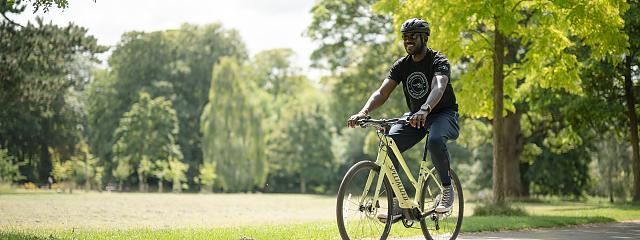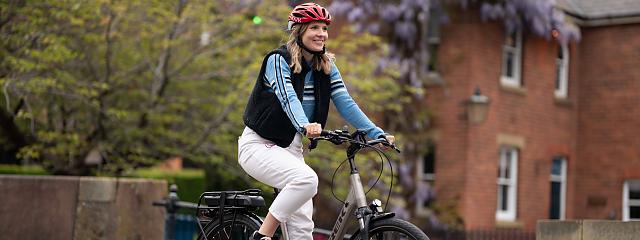
A tale of two e-cities: making cycling easier from Manchester to Sheffield
A tale of two e-cities: making cycling easier from Manchester to Sheffield
- Two charity workers used e-bikes to commute from their home city of Manchester to a meeting in Sheffield to encourage others to use e-cycles as a form of transport
- The pair pedalled 40 miles, taking in the Peak District National Park to an elevation of 3,000 feet in just over three hours and arrived at their destination with battery charge to spare
- Cycling UK’s new free scheme, Making cycling e-asier, is helping communities in England to start e-cycling regularly by offering free e-cycle loans and skills and confidence sessions
- Photos available at skyfish.com/p/cyclinguk/2241708
Ryan Smith and Simon Ward, who work on Cycling UK’s new free e-cycle scheme Making cycling e-asier, borrowed two fully charged Specialized Turbo Vado SL 4.0 e-cycles from the pilot project and made it to their meeting on time with battery life left.
The pair completed the 40-mile (64km) ride, which took them over one of England’s steepest hills, Bamford Clough Hill, in just three and a half hours. Along the way they climbed more than 3,100ft – almost the equivalent of climbing England’s highest peak, Scafell Pike (3,209ft).
Simon Ward, Cycling UK behaviour change officer at Making cycling e-asier, said:
“We decided to set ourselves the challenge of pedalling Making cycling e-asier e-cycles from Sheffield to Manchester to prove that you don’t always have to rely on cars and public transport to get around.
“The motor assistance on our e-bikes meant that neither of us struggled or felt very out of breath as we pedalled up steep hills. However, we both still really felt the benefits of incorporating exercise into our mega-commute.”
To travel home, Ryan and Simon hopped on a train with their e-bikes, which was a seamless process as the train had dedicated cycle carriage on board.
Not only did the duo feel the mental and physical benefits of pedalling, by choosing to e-cycle, they saved money they would have otherwise spent on taking the train or driving a car.
A single train ticket from Manchester to Sheffield can cost anywhere from £8-£24, and a monthly season pass costs more than £320.
According to RAC, the average cost of unleaded petrol is 148.50 pence per litre, meaning driving 40 miles per week, or around five miles per day, costs more than £10 per week, before taking the cost of a car, insurance and regular repairs into account.
In England, currently 59% of journeys under five miles are driven, however the cost-of-living-crisis is pushing many to consider alternative and cheaper ways to travel. Making cycling e-asier aims to support communities in Manchester, Sheffield, Leicester and Luton and Dunstable by encouraging them to pedal when they can.
People in Manchester and Sheffield can access Making cycling e-asier through community hubs, selected workplaces and Evans Cycles.
Jenny Box, Deputy director of Making cycling e-asier, commented:
“Cycling UK has already heard from Making cycling e-asier beneficiaries who have started e-cycling regularly as a result of their free one-month loan.
“Ryan and Simon’s enthusiasm and determination has proven that e-cycling can be a practical mode of transport. We understand that pedalling for a 40-mile journey isn’t realistic for many, however people can still enjoy the benefits of e-cycling through pedalling for short everyday journeys.”
By giving people the opportunity to discover the cost, health and environmental benefits of e-cycling, it is hoped that Making cycling e-asier, which is funded by Department for Transport, will help them make the decision to pedal more and cut down on unnecessary short car journeys.
Simon added:
“I’d not want to tackle such a ride every day, especially for work, but most of my journeys are short so it’s good to know an e-bike can make those journeys a breeze. It’s amazing to think how much money you can save and how much better you can feel by driving less and cycling more often.”
For more information, please contact the national Cycling UK press office www.cyclinguk.org/contact/press-and-media. If you would like to speak to a member of the press office during working hours (0900-1700) please call Joanne Clark on 07917 243925 or email publicity@cyclinguk.org. Out of hours, call 07584 271 300.
For more information, please visit cyclinguk.org/making-cycling-e-asier
To view Ryan and Simon’s route, please visit ridewithgps.com/routes/41944951
Photos available at skyfish.com/p/cyclinguk/2241708
- Cycling UK, the UK’s cycling charity, imagines a world where the streets are free of congestion and the air is clean to breathe, where parents encourage their children to cycle to school and everyone shares the exhilaration of being in the saddle. For more than 140 years, we’ve been making our streets safer, opening up new traffic free routes and inspiring more people to cycle more often. www.cyclinguk.org
- Confirmed Making cycling e-asier partners supporting the delivery include Evans Cycles, Raleigh Bikes, Specialized, Tier Mobility, Islabikes, Wheels for All, Bikeworks, Fusion Media, Modeshift, Cyclescheme, Bike Right, Sharebike, Transport for Quality of Life.
- The Department for Transport works with its agencies and partners to support the transport network that helps the UK’s businesses and gets people and goods travelling around the country. It plans and invests in transport infrastructure to keep the UK on the move.
- The new executive agency, Active Travel England, will deliver the Government’s cycling and walking priorities, enabling more people in England to choose walking and cycling for their everyday journeys.
- Through government initiatives such as the Cycle to Work scheme, people can save 25-39% when purchasing a new e-cycle and accessories.
- The average cost of an e-cycle purchased through CycleScheme is £3,000, which after the discount would cost around £170 per month. For those looking to spend a little less, a standard £1,000 e-cycle can be purchased for £60 per month for just one year, after which time the only costs will be occasional maintenance and charging.












